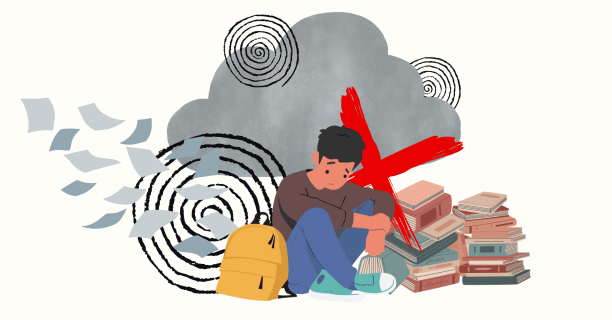Why do we attach our self-worth to achievements?

For most of my life, I defined who I was by what I could do. This was not acts of kindness, my personal wit and humour, or a confidence in myself regardless of my circumstances. Who I was, for a very long time, was what I could accomplish.
Even if I was unwell, my grades had to be perfect. Even though I hated competition, I had to be the best at every activity I took up. If that wasn't possible, the impossibility was a symbol of failure
Nothing I did was ever enough, and it crushed me to know that.
Although I no longer believe this, as a young adult, I see more and more of my friends and peers struggling with the belief that achievement is what allows us to have self-worth. Moving beyond this mindset is a difficult process, it can sometimes take years. In order to acknowledge how deep this feeling truly goes, it's important to understand the ways different people live with it.
Most often, this feeling develops naturally enough that we don't really notice. Achievements slowly shift from a goal to an identity you feel like you can't lose. Perhaps your parents base punishment and affection on success. As Asha Aanandi*, a high school student, shares, "I noticed whenever I did something that could be considered an achievement, my mother immediately became more supportive of me, more loving towards me. Somewhere along the line, achievements became the only way I felt validated from my ma."
Before I was even a teen, I began to feel like I wasn't unique, or someone worthwhile who deserved love or care unless I had achieved something. I believed that there was always another step left to take before I would be good enough. My inner monologue was an unstoppable stream of self-loathing and criticism.
"If I didn't have achievements, what did I have? In primary and middle school, I had finally reached the top of my class in terms of grades as per my parents' expectations. But what do you do now? Now that you're at the conceivable top?" asks Mushfiq Alam, an A level student at Maple Leaf International School.
"You start finding other avenues to compete in, such as competitions, activities, etc. This time it was in order to satisfy my own expectations and feel worthy. This made being happy with myself very difficult, and dissatisfaction too easy," Mushfiq shares how he initially found unsustainable coping mechanisms.
Sometimes, our distorted perceptions of achievement and our worth as people can bleed into how we treat others. As in the case of Asha, "Just the thought of doing something which I know is not going to be perfect repels me from doing the thing. It has to be the best or there's no value in it - it becomes a waste of time. Socially, even if I don't want to, I subconsciously become dismissive towards those without a high academic performance or any significant achievements; I feel myself become distant, even though the love I have for the person is insurmountable."
Letting go of an achievement-based sense of self-worth needs to be deliberate. For me, fixing the damage meant taking active decisions for my wellbeing that I had never learned to make before. I had to break down an entire personal belief system cemented over almost a decade, force myself every moment of every day to reject my inner voice projecting constant self-hatred, and consciously work towards divorcing my perception of myself over what other people said or thought about me. Everything I did was for one main goal: to accept me for me, and not a caricature of what I thought I could be.
It's tough to say what might help someone else, the complexity of these feelings varies from person to person. "Of course, there are some positives, such as pushing myself to work hard and become smarter. But I'd argue that it has been a net negative. Once you're conceived as someone 'smart', people around you start having high expectations of you. It can be crushing at times. Almost all of my friends are similarly well-accomplished, 'smart', and 'well-read'. I've also struggled making friends with or socialising with people who don't share my distinct world views or interests, or don't want to think the way I tend to," says Mushfiq.
However, I would still say that there are a few necessary steps to starting to be more kind to yourself. First, you have to believe it's something you deserve. Convincing yourself you deserve good things after a lifetime of not accepting happiness unless "earned" can feel impossible. It can feel exhausting and humiliating. But I realised that I owe it to myself - for the simple reason of being the only one who could give it to me.
Second is figuring out what to do to get there. For some, it might take emotional and mental effort, and for others, it might take physical effort to slowly reduce acts of physical punishment like not eating. We have to learn how to treat ourselves with the kindness we would give someone we love.
Finally, allow yourself to try, and to lean on loved ones for help. Building a new state of being for yourself might be the hardest thing you ever have to do, but if it is, every morning you wake up will feel just a little easier.
Nadera Naeema Ohi is an A Level student at Maple Leaf International School.



 For all latest news, follow The Daily Star's Google News channel.
For all latest news, follow The Daily Star's Google News channel.
Comments